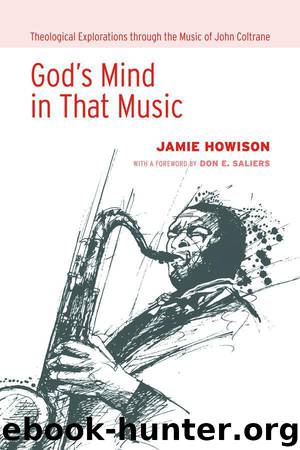God's Mind in That Music: Theological Explorations through the Music of John Coltrane by Howison Jamie

Author:Howison, Jamie [Howison, Jamie]
Language: eng
Format: epub
Publisher: Cascade Books
Published: 2012-10-16T16:00:00+00:00
6
“Alabama”
Lament
The bombing of the Sixteenth Street Baptist Church in Birmingham is but a single manifestation of this crisis, although somehow more than typical. It is fitting to begin with Birmingham as there is something about the violation of childhood (and perhaps of worship) and what can be called without exaggeration an attendant reaction of horror that best introduces this decade of radical questioning.
—James C. Hall, Mercy, Mercy Me
It is a striking piece of music. If anyone wants to begin to understand how Coltrane could inspire so much awe so quickly, the reason is probably inside “Alabama.” The incantational tumult he could raise in a long improvisation, the steel-trap knowledge of harmony, the writing—that’s all very impressive. But “Alabama” is also an accurate psychological portrait of a time, a complicated mood that nobody else could render so well.
—Ben Ratliff, Coltrane
At 10 :22 on the morning of Sunday September 15 , 1963 , Robert “Dynamite Bob” Chambliss detonated a charge of dynamite in Birmingham’s Sixteenth Street Baptist Church, wounding several church members and killing four young girls. Three of the girls were fourteen years old, and the fourth only eleven. Though Chambliss and three associates underwent an FBI investigation, in the end he was issued only a small fine and sentenced to a six-month jail sentence for possession of a box of over a hundred sticks of dynamite.
On November 18 , 1963 John Coltrane took his quartet into the studio and recorded “Alabama,” his haunting lament for all that was lost—and all that was signified—in the violence of that morning in Birmingham. As recalled by Coltrane’s friend, the bass player Art Davis, “He was very conscious of what was happening when those girls were murdered in the bombing in Alabama. He was incensed—we talked about that. And for this to happen in a House of God and people were there worshipping God and for people to bomb a church like that, he said, ‘That’s reprehensible. I’m livid with the hate that can happen in this country.’” 1 What was recorded that day and released in January 1964 as one of two studio tracks on the Live at Birdland album doesn’t strike the listener as being particularly angry, though for a brief section near the end of the piece the quartet does cry out with an impassioned intensity. No, as a statement “Alabama” is mournful and melancholic, yet filled with dignity and a firm resolve. In his album liner notes LeRoi Jones / Amiri Baraka describes the piece as having “a slow delicate introspective sadness” which is “almost hopelessness, except for Elvin [Jones], rising in the background like something out of nature.” Almost hopeless, in the same way that the deepest of the blues and the deepest of the biblical laments sing out the experience of lostness as a way of telling the truth, and so of somehow keeping hope alive. To be mute in the midst of sorrow, that is hopelessness. “How could we sing the Lord’s song in a foreign land?,” asks the author of Psalm 137 .
Download
This site does not store any files on its server. We only index and link to content provided by other sites. Please contact the content providers to delete copyright contents if any and email us, we'll remove relevant links or contents immediately.
The Goal (Off-Campus #4) by Elle Kennedy(13643)
Kathy Andrews Collection by Kathy Andrews(11797)
Diary of a Player by Brad Paisley(7540)
Assassin’s Fate by Robin Hobb(6189)
What Does This Button Do? by Bruce Dickinson(6188)
Big Little Lies by Liane Moriarty(5774)
Altered Sensations by David Pantalony(5089)
Pale Blue Dot by Carl Sagan(4986)
Sticky Fingers by Joe Hagan(4177)
The Death of the Heart by Elizabeth Bowen(3596)
The Heroin Diaries by Nikki Sixx(3534)
Beneath These Shadows by Meghan March(3293)
Confessions of a Video Vixen by Karrine Steffans(3292)
How Music Works by David Byrne(3249)
The Help by Kathryn Stockett(3130)
Jam by Jam (epub)(3069)
Harry Potter 4 - Harry Potter and The Goblet of Fire by J.K.Rowling(3048)
Computational Linguistics and Intelligent Text Processing: 20th International Conference, CICLing 2019 La Rochelle, France, April 7â13, 2019 Revised Selected Papers, Part I by Alexander Gelbukh(2975)
Strange Fascination: David Bowie: The Definitive Story by David Buckley(2848)
